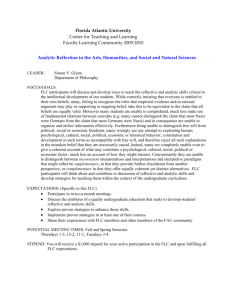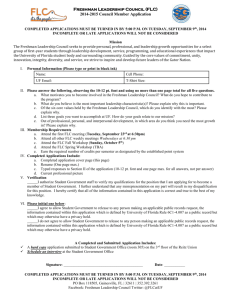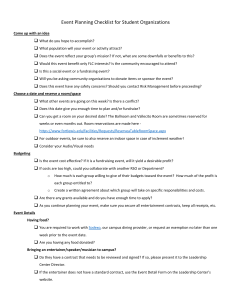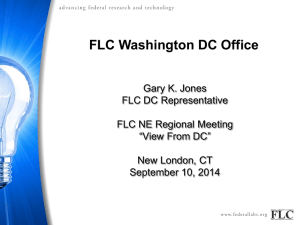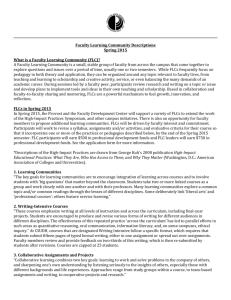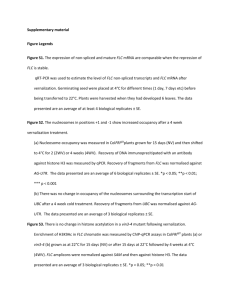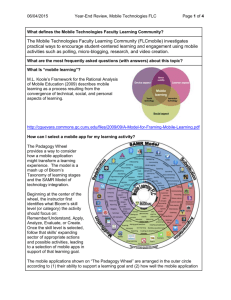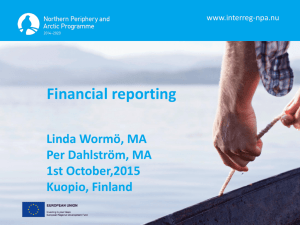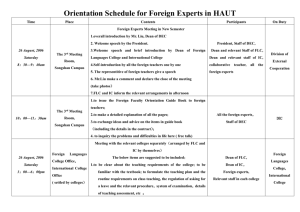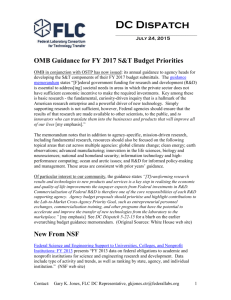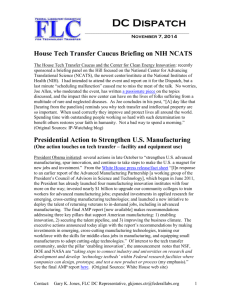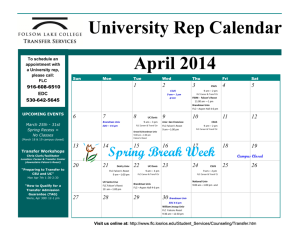Request for Applications
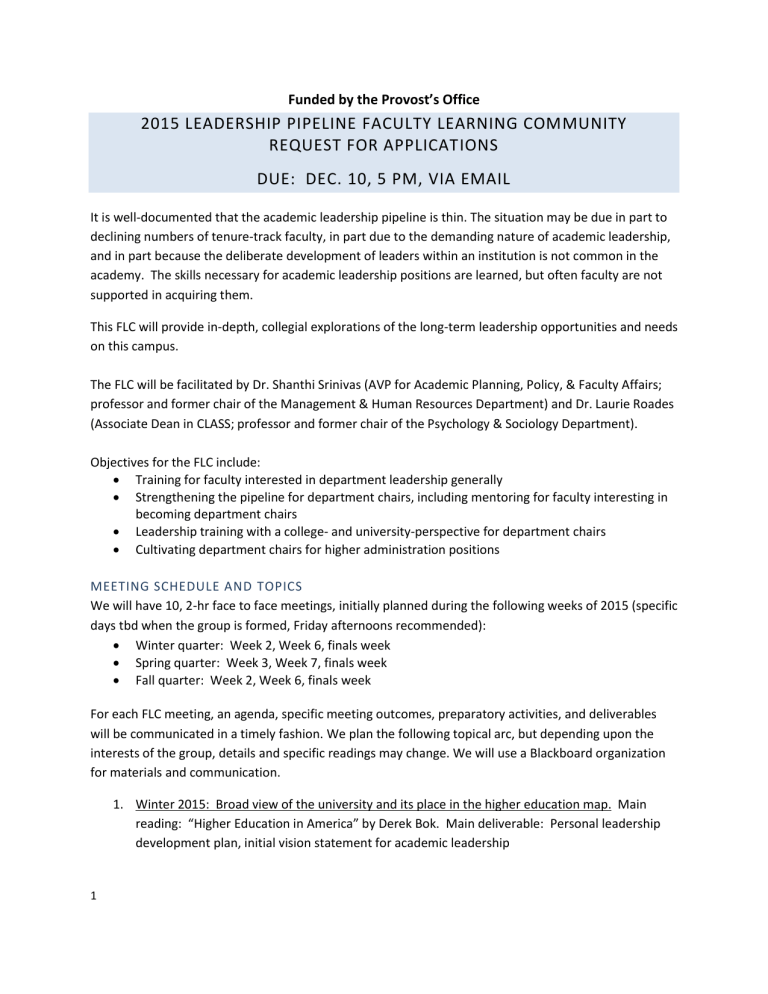
1
Funded by the Provost’s Office
2015 LEADERSHIP PIPELINE FACULTY LEARNING COMMUNITY
REQUEST FOR APPLICATIONS
DUE: DEC. 10, 5 PM, VIA EMAIL
It is well-documented that the academic leadership pipeline is thin. The situation may be due in part to declining numbers of tenure-track faculty, in part due to the demanding nature of academic leadership, and in part because the deliberate development of leaders within an institution is not common in the academy. The skills necessary for academic leadership positions are learned, but often faculty are not supported in acquiring them.
This FLC will provide in-depth, collegial explorations of the long-term leadership opportunities and needs on this campus.
The FLC will be facilitated by Dr. Shanthi Srinivas (AVP for Academic Planning, Policy, & Faculty Affairs; professor and former chair of the Management & Human Resources Department) and Dr. Laurie Roades
(Associate Dean in CLASS; professor and former chair of the Psychology & Sociology Department).
Objectives for the FLC include:
Training for faculty interested in department leadership generally
Strengthening the pipeline for department chairs, including mentoring for faculty interesting in becoming department chairs
Leadership training with a college- and university-perspective for department chairs
Cultivating department chairs for higher administration positions
MEETING SCHEDULE AND TOPICS
We will have 10, 2-hr face to face meetings, initially planned during the following weeks of 2015 (specific days tbd when the group is formed, Friday afternoons recommended):
Winter quarter: Week 2, Week 6, finals week
Spring quarter: Week 3, Week 7, finals week
Fall quarter: Week 2, Week 6, finals week
For each FLC meeting, an agenda, specific meeting outcomes, preparatory activities, and deliverables will be communicated in a timely fashion. We plan the following topical arc, but depending upon the interests of the group, details and specific readings may change. We will use a Blackboard organization for materials and communication.
1.
Winter 2015: Broad view of the university and its place in the higher education map. Main reading: “Higher Education in America” by Derek Bok. Main deliverable: Personal leadership development plan, initial vision statement for academic leadership
2
2.
Spring 2015: Leadership opportunities on campus. Main reading: “Field Guide to Academic
Leadership” by Richard Diamond. Main deliverable: Outline of application for leadership academies such as ACE Fellowships, Harvard Institutes for Higher Education, etc. (if desired); revised vision statement for academic leadership
3.
Fall 2015: Specific skills and local dilemmas. Main reading: “Department Chair Leadership
Skills” by Walter Gmelch and Val Miskin. Main deliverable: development of case studies and solutions for department issues; final report on value of FLC.
WHO SHOULD APPLY?
This FLC is for faculty from any discipline who are past the “new faculty” stage (defined by the applicant). Applicants should be faculty who want to think deeply about the leadership needs on this campus, and who may be interested in entering the leadership pipeline on campus, based on a shared vision of the value of leadership on campus. Tenure-line faculty and lecturers are eligible to apply.
Please ensure that you are able to devote the time to participate in meetings, to prepare for the meetings by doing the readings, and to generate the main deliverables.
BENEFITS
Tangible benefits: Each FLC member will receive $500 for travel or other professional development expenses when most FLC deliverables are nearing completion. FLC members will also receive all books and materials, plus breakfast/lunch if meetings are scheduled during meal times.
Intangible benefits: Priceless. The real benefit of a faculty learning community is the opportunity to think deeply in the company of other faculty who challenge and support one another.
CRITERIA:
The main criteria to participate in this FLC are to be willing to engage fully in the learning community and to be able to devote the necessary time. This FLC has funding for up to 8 faculty members. The final selection will include considerations of diversity in discipline, faculty career stage, course type, and other perspectives.
INSTRUCTIONS TO APPLY:
Please email your application to Victoria Bhavsar, vbhavsar@cpp.edu
. Please include an electronic signature (typed name) on the commitment statement page.
3
APPLICATION FOR THE LEADERSHIP PIPELINE FACULTY LEARNING COMMUNITY
Name:
Years at Cal Poly Pomona:
Department:
Telephone:
Email:
Please answer the questions below briefly (1-2 paragraphs). Extensive detail is not necessary.
1.
What campus leadership or service activities are you currently involved in?
2.
What are some challenges that you have experienced in these activities? What would you like to learn about leading more effectively?
3.
How would the Leadership Pipeline FLC be helpful for you at this point in your career?
4.
This FLC requires a serious time commitment for 3 quarters. Please comment on how you will accommodate the time.
Please read, check off, and provide an electronic signature (type name) on the Commitment Statement on the next page. Email your application to Victoria Bhavsar, vbhavsar@cpp.edu
, by December 10,
2014.
For questions: Please contact Dr. Victoria Bhavsar at the Faculty Center (x4640, vbhavsar@cpp.edu
).
COMMITMENT STATEMENT
If selected as a member of the Leadership Pipeline FLC, I agree to participate fully in the program’s activities. I understand that the $500 in professional development funds will be available to me when
FLC deliverables are near completion.
Electronic Signature __________________________________ Date ______________
